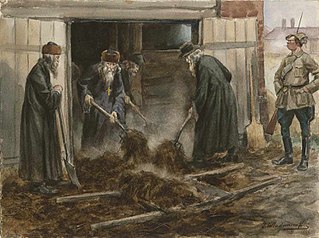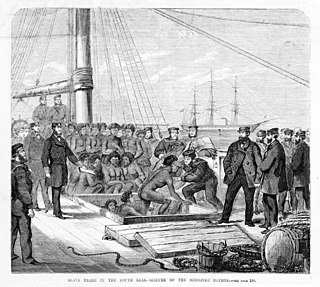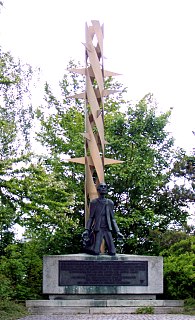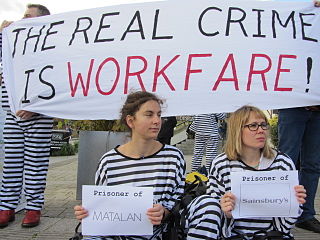 W
WForced labour, or unfree labour, is any work relation, especially in modern or early modern history, in which people are employed against their will with the threat of destitution, detention, violence including death, compulsion, or other forms of extreme hardship to either themselves or members of their families.
 W
WAbolition of Forced Labour Convention, 1957, the full title of which is Convention concerning the Abolition of Forced Labour, 1957, is one of the eight ILO fundamental conventions of the International Labour Organization, which cancels certain forms of forced labour still allowed under the Forced Labour Convention of 1930, such as punishment for strikes and as a punishment for holding certain political views.
 W
W"Initiative Z" was an attempt by Communist Czechoslovakia to tap a volunteer work and community spirit toward supplementing local infrastructure and public facility improvement using volunteer work while the construction material and the logistics were provided by the government.
 W
WThe Alfried Krupp Institute for Advanced Study in Greifswald is an institute for advanced study named after Alfried Krupp von Bohlen und Halbach. On 20 June 2000, this institute was founded by the Alfried Krupp von Bohlen und Halbach Foundation, the German Land of Mecklenburg-Vorpommern and the University of Greifswald. These three founders co-established and contributed to the Stiftung Alfried Krupp Kolleg Greifswald, which was entrusted with the task of establishing this Wissenschaftskolleg. The Krupp Foundation contributed the plot of land and the building on it, valued at €15.3m, while Mecklenburg-Vorpommern and the University of Greifswald contributed the operational funding that initially amounted to €4.1m.
 W
WA batey is a settlement around a sugar mill. They can be found in Cuba, Dominican Republic and Puerto Rico.
 W
WBlackbirding involves the coercion of people through deception or kidnapping to work as slaves or poorly paid labourers in countries distant to their native land. The term has been most commonly applied to the large-scale taking of people indigenous to the numerous islands in the Pacific Ocean during the 19th and 20th centuries. These blackbirded people were called Kanakas or South Sea Islanders. They were taken from places such as the Solomon Islands, Vanuatu, Niue, Easter Island, Gilbert Islands, Tuvalu and the islands of the Bismarck Archipelago amongst others.
 W
WChild auction was a historical practice in Sweden and Finland during the 19th and early 20th centuries, in which orphan and poor children were boarded out in auctions. The name "auction" however does not refer to actual slave auctions, as the children in these auctions were never actually bought in a legal sense, but the name has become the common name for the practice.
 W
WColtan is a dull black metallic ore from which the elements niobium and tantalum are extracted. The niobium-dominant mineral in coltan is columbite, and the tantalum-dominant mineral is the tantalite.
 W
WConscription in South Korea has existed since 1957 and requires male citizens between the ages of 18 and 28 to perform compulsory military service. Women are not required to perform military service, but they may voluntarily join the military.
 W
WThe Correctional Labour Camp was a kind of penitentiary institution. Under various names and forms of ownership, they exist practically all over the world, but with the name "Correctional Labour Camp", institutions of this type existed only in the Soviet Union.
 W
WCorvée is a form of unpaid, forced labour, which is intermittent in nature and which lasts limited periods of time: typically only a certain number of days' work each year.
 W
WThe encomienda was a Spanish labor system that rewarded conquerors with the labor of particular groups of conquered non-Christian people. The laborers, in theory, were provided with benefits by the conquerors for whom they labored, the Catholic religion being a principal benefit. The encomienda was first established in Spain following the Christian conquest of Moorish territories, and it was applied on a much larger scale during the Spanish colonization of the Americas and the Spanish Philippines. Conquered peoples were considered vassals of the Spanish monarch. The Crown awarded an encomienda as a grant to a particular individual. In the conquest era of the sixteenth century, the grants were considered to be a monopoly on the labor of particular groups of indigenous peoples, held in perpetuity by the grant holder, called the encomendero, and their descendants.
 W
WAn encomienda in Peru was a reward offered to each of the men under the leadership of Francisco Pizarro who began the Spanish conquest of the Inca Empire in 1532. In the early colonial period of the New World, land had little economic value without the labor to exploit it. The grant of an encomienda gave the grantee, the encomendero, the right to collect tribute from a community of indigenous people." The word "encomienda" means "trust" and meant that the indigenous people were entrusted to the care and attention of an encomendero. In reality, the encomienda system is often compared to slavery. Theoretically, the encomendero did not own the people or the land occupied by his subjects, but only the right to tribute, usually in the form of labor, that he could extract from them.
 W
WIn the years following World War II, large numbers of German civilians and captured soldiers were forced into labor by the Allied forces. The topic of using Germans as forced labor for reparations was first broached at the Tehran conference in 1943, where Soviet premier Joseph Stalin demanded 4,000,000 German workers.
 W
WThe Forced Labour Convention, the full title of which is the Convention Concerning Forced or Compulsory Labour, 1930 (No.29), is one of eight ILO fundamental conventions of the International Labour Organization. Its object and purpose is to suppress the use of forced labour in all its forms irrespective of the nature of the work or the sector of activity in which it may be performed. The Convention defines forced labour as "all work or service which is exacted from any person under the menace of any penalty and for which the said person has not offered himself voluntarily", with few exceptions like compulsory military service. The convention excludes "adult able-bodied males", to whom legal imposition of forced labour is allowed.
 W
WThe Reich Labour Service was a major organisation established in Nazi Germany as an agency to help mitigate the effects of unemployment on the German economy, militarise the workforce and indoctrinate it with Nazi ideology. It was the official state labour service, divided into separate sections for men and women.
 W
WA hacienda, in the colonies of the Spanish Empire, is an estate, similar to a Roman latifundium. Some haciendas were plantations, mines or factories. Many haciendas combined these activities. The word is derived from the Spanish verb "hacer" or its gerund "haciendo", from Latin "facer", meaning 'to make' and 'making' respectively, and were largely business enterprises consisting of various money-making ventures including raising farm animals and maintaining orchards.
 W
WMilitary Units to Aid Production or UMAPs were agricultural concentration camps operated by the Cuban government from November 1965 to July 1968 in the province of Camagüey. The UMAP camps served as a form of forced labor for Cubans who could not serve in the military due to being, conscientious objectors, Christians and other religious people, homosexuals, or political enemies of Fidel Castro or his communist revolution. The language used in the title can be misleading, as pointed by historian Abel Sierra Madero, "The hybrid structure of work camps come military units served to camouflage the true objectives of the recruitment effort and to distance the UMAPs from the legacy of forced labor." There is no official account of the internships of the UMAP's, but it has been estimated that the majority of the servicemen were conscientious objectors.
 W
WThe Peruvian Amazon Company, also called the Anglo-Peruvian Amazon Rubber Co, was a rubber boom company that operated in Peru in the late 1800s and early 1900s. Based in Iquitos, it became notorious for the ill treatment of its indigenous workers in the Amazon Basin, whom its field forces treated as virtual slaves. The company's practices were exposed in 1913 by the investigative report of British consul-general Roger Casement and an article and book by journalist W. E. Hardenburg.
 W
WShanghaiing or crimping is the practice of kidnapping people to serve as sailors by coercive techniques such as trickery, intimidation, or violence. Those engaged in this form of kidnapping were known as crimps. The related term press gang refers specifically to impressment practices in Great Britain's Royal Navy.
 W
WTianshui Association is a mutual assistance association in Japan of the 300 Japanese railway engineers who worked under forced labor for the construction of the Tianshui-Lanzhou Railway, Gansu Province, China.
 W
WWorkfare in the United Kingdom is a system of welfare regulations put into effect by UK governments at various times. Individuals subject to workfare must undertake work in return for their welfare benefit payments or risk losing them. Workfare policies are politically controversial. Supporters claim that such policies help people move off welfare and into employment whereas critics argue that they are analogous to slavery or indentured servitude and counterproductive in decreasing unemployment.